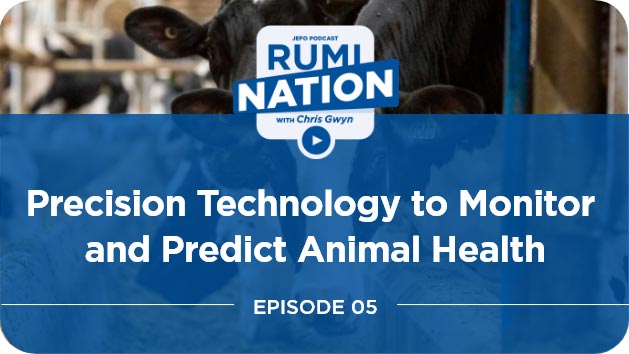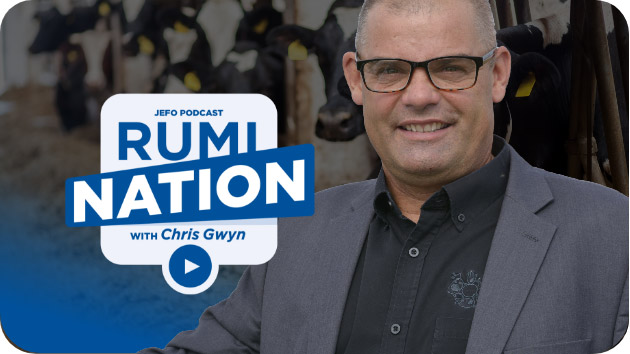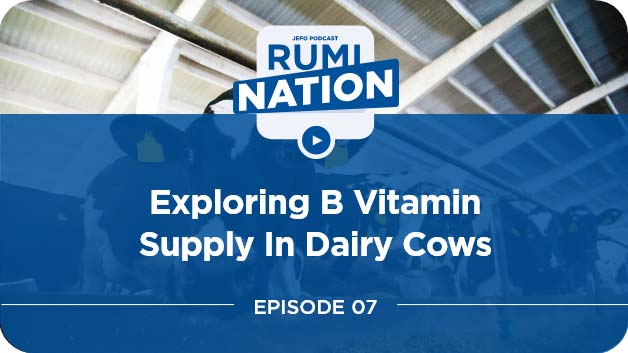RumiNation | S03 : E06
Impacts of Stress and Strain on the
Reproductive Health of Dairy Cows
Brought to you by Jefo Nutrition
Share now!
Did you enjoy this episode?
Share now!
Impacts of Stress and Strain on the Reproductive Health of Dairy Cows
The difference between stress and strain, the importance of genetics, nutrition and farm management for milk production and cow reproduction are the main topics discussed in this episode with Dr. Matt Lucy from the University of Missouri.
Our guest - Dr. Matt Lucy
Dr. Matt Lucy is Professor of Animal Science at the University of Missouri-Columbia and Editor-in-Chief of the Journal of Dairy Science. He received a B.S. from Cornell University, an M.S. from Kansas State University and a Ph.D. from the University of Florida. Dr. Lucy’s current research program examines the physiological processes regulating fertility in dairy cows and explores practical methods that evolve from this research.

Timestamps & Summary
1:41
Could you give us an overview of the biological impact of stress on the dairy cow reproduction?
Dr. Matt Lucy
I think stress is a big factor in our ability to get cows pregnant. Traditionally, we always thought about the effects of stress on ovarian function. Whether or not the cow had started cycling and come into heat. But more recently, what we work on now is trying to understand specifically how stress affects uterine function and the preparation of the uterus for that pregnancy.
3:12
I’d love you to expand a bit more on that in relation to reproductive outcomes.
Dr. Matt Lucy
It is important to understand the difference between stress and strain. Are dairy cows stressed? Yes, they are. But it’s really the strain that matters. The strain is how that cow responds to that stress. So let me expand upon what that means. If we think about different stressors, a stress is applied to all cows. For example, we have a lot of cows in our herd that make 100 pounds of milk per day. That is the stress. The stress is the production. However, the strain is how she responds to that. And we want our cows to have very little strain.
4:52
There are some in-depth biology and physiology going on behind this, right?
Dr. Matt Lucy
When we talk about the production of milk, there is just tremendous metabolic shift that occurs in response to it. It just comes down to how cows respond. There is a debate right now among nutritionists involving questions like: Do postpartum BHB really matter? Is it important? Do we need to measure it? Do we need to be concerned? BHB can be a toxic molecule for cows, obviously. We are trying to understand how cows respond to these metabolic changes and figuring out which cows are going to stay healthy in the face of a similar sort of challenge.
6:55
What do you think producers and nutritionists can do to manage those stressors?
Dr. Matt Lucy
I will start with genetics. We want cows that can handle these stresses. That has been a big change mentally because for many years, we only selected cows for milk production. Now we have probably too many traits. You want the best possible cows on your farm. And genetics really make a difference. But, I would also remind people that the genomics revolution that we’re in now is a very young revolution, so we need to keep our eyes on the ball and make sure we got the cows going in the right direction genetically.
Once we have the right kind of cows, then, as a producer, you have to manage the remaining strain. You cannot fix everything with genetics, you have to be a top producer and manage the remaining strains like heatstroke, nutrition, bunk space and so forth.
Third thing I would say is when we talk about reproduction, people often try to manage itn during the breeding period. But, reproduction doesn’t start during the breeding period. Reproduction starts in the transition cow pens. The reason that transition cow pen is so important is because if they get a reproductive disease, or if they get sick, there is always going to be a long-term drag on that cow.
14:49
One topic I wanted to address is glucose. Could you take a couple of minutes just to highlight how that affects the reproductive fitness of a cow?
Dr. Matt Lucy
Glucose is a really tough molecule for ruminants, because they take on all these nutrients, and they metabolize them. They break them down into smaller molecules. Then they have to resynthesize that glucose in the liver. And of course, that glucose is made for its use for lactose synthesis. Glucose is the master regulator of all the metabolism of a cow.
21:50
If we could just summarize, what would be the take-home points to veterinarians, nutritionists and dairy producers around the world when it comes to stressors and strain?
Dr. Matt Lucy
I would say, number one, is getting your genetics right. There is no substitute for good cows.
But you also need good management and there’s no magic, there’s no easy way out of good management.
The transition cow pen has to be right.
And the other thing I failed to mention; the parlors got to be right. The fact that if a cow gets mastitis, from three weeks before to three weeks after breeding, she has lower fertility.







